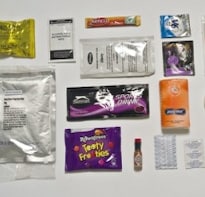An army marches on its stomach but what do different countries feed their troops? Who gets smoked sprats or tinned cheddar - and who wants 'three-year pizza'?
Advertisement
Advertisement
Italy
Advertisement
France
Germany
Advertisement
UK
Australia
Spain
US
Canada
Denmark
Estonia
Singapore
For the latest food news, health tips and recipes, like us on Facebook or follow us on Twitter and YouTube.
Advertisement
